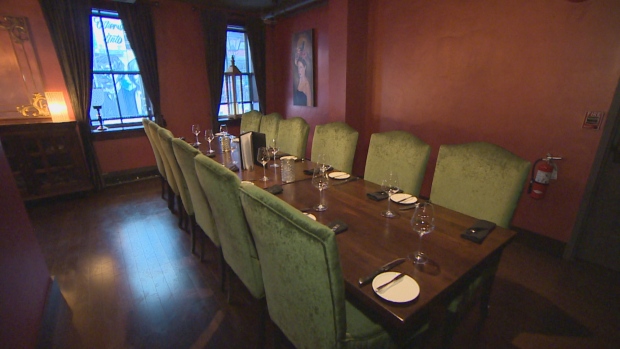KJIPUKTUK (Halifax) – A restaurant co-owner in Halifax has dedicated a private room in his establishment for settlers to eat dinner and reconcile with Indigenous peoples.
“As of Monday, the room — called a Legacy Room — will become a place that creates awareness and healing after Canada’s long history of injustices against Indigenous people,” reports the CBC. There’s a feather and a smudging bowl, so everything is ready to go.

The idea of Legacy Rooms has been propagated by Assembly of First Nations chief Morley Googoo. There is one at the Dalhousie Killam Library, there is one at in the works for City Hall, and, as the CBC informs us, now there is one at the Barrington Steakhouse and Oyster Bar in downtown Halifax.
It’s “part corporate responsibility, part smart business,” says the owner.
I am not going to make fun of this silly idea, nor of the restaurant owner, who no doubt means well. I do have a beef with the CBC though. Our public broadcaster should know better.
Enjoying a 45-day Dry Aged Bourbon Infused Ribeye, sipping wine, and having a pleasant chat is not what reconciliation means.
The problem isn’t just “Canada’s long history of injustices against Indigenous peoples,” the problem is that these injustices are ongoing.
The idea of racism isn’t mentioned once in the CBC story yet it is foundational to understanding the historic and ongoing harm done by settlers to Mi’kmaq.
I’m still figuring things out, but I think that for reconciliation from a settler perspective to be effective it must hurt. At a personal level it involves acknowledging benefits derived from white privilege, and at a political level it means the return of things unlawfully taken, like land. Oh, and the tearing down of the odd statue.
A civilized conversation during a pleasant dinner is not what reconciliation is about.
If you can, please support the Nova Scotia Advocate so that it can continue to cover issues such as poverty, racism, exclusion, workers’ rights and the environment in Nova Scotia. A pay wall is not an option, since it would exclude many readers who don’t have any disposable income at all. We rely entirely on one-time donations and a tiny but mighty group of dedicated monthly sustainers.



